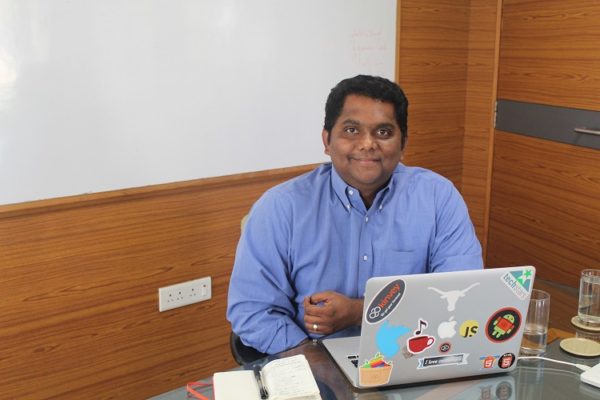One of the pioneers in the space of backend-as-a-service, Kinvey has faced stiff competition from larger enterprise rivals like Amazon, IBM, Red Hat and SAP.
In our smartphone-saturated world, everyone dreams of being an app developer. But somebody’s got to build the platform that lets you turn your next big idea into a practical mobile solution. Enter Sravish Sridhar, founder of the mobile developer platform Kinvey, which was ranked as the No. 1 platform in Forrester’s recent 2016 Q4 Mobile Development Platform Wave report.
What Kinvey does as a platform for mobile, tablet and web apps is allow developers to focus entirely on the user experience, as it handles a range of backend services such as data storage, push notifications, SMS and email services, location context, user analytics and more.
Sridhar, who did his schooling in Chennai before moving to the University of Texas at Austin for his Bachelor’s degree in Computer Science, kicked off his start-up journey with a grid computing start-up called United Devices (UD), which was bought out in 2007. In 2011, he founded Kinvey in Boston, recognising that with a mobile backend as a service, he could reach out to millions more people than with even the best app idea.
“I started off building ideas like games and apps around families staying in touch with their kids. But one thing I noticed was that the technological capabilities one needed were the same, irrespective of the idea – I still needed a place to store information, I still needed a place to log in or analytics to track it. If somebody could build a platform and put all the features that every application needs and deliver it out of the box, one could become a de facto whenever anyone builds an app,” he explains.
One of the pioneers in the space of backend-as-a-service, Kinvey has faced stiff competition from larger enterprise rivals like Amazon, IBM, Red Hat and SAP. What has helped Kinvey find its way to the top of the heap, says Sridhar, is its commitment to encouraging innovation. There’s two sides to the enterprise, he says, “One capitalist side is that we have to make the money, but there’s another side to it, and that is to help in innovation.”
It’s this focus on innovation that also has structures Kinvey’s offerings as a one-stop solution for app development, with flexible pricing options suited for innovators. “It’s only after an app becomes successful that they have to pay us well. I’m a big believer in innovation and this is the best possible way to do it,” says Sridhar.
Working mostly in the enterprise space, Sridhar says, a lot of Kinvey’s client base comes from the health sector. “. In India, we want to create a digital health network. Use health applications, people should be able to track their health conditions, speak to their doctors and have video chats. We also want to help entrepreneurs in skill development,” he says.
While Kinvey has partnered with Indian companies like Wipro, Cognizant and ITC, Sridhar says that the company plans to enter the Indian market in a bigger way in the next year.
“Today, in India, everyone has a phone and other apps, but many firms do not connect on these platforms. But it’s a place where in five to 10 years, there is an opportunity for every big, small or medium enterprise to fully utilise digital platforms.”






Leave a reply